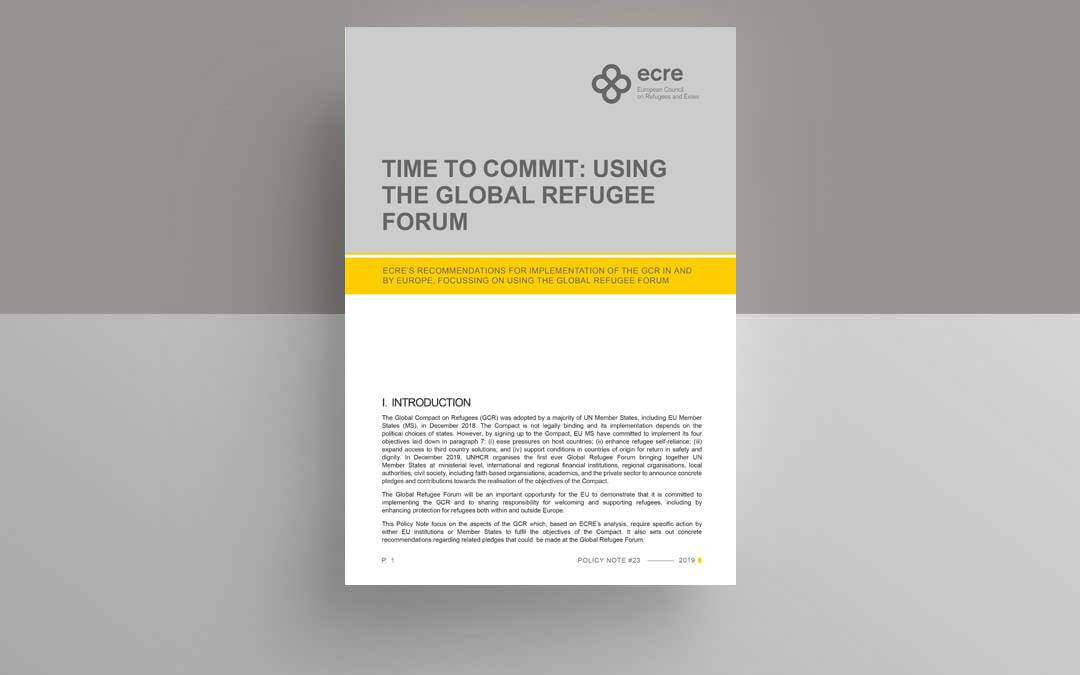ECRE has published a Policy Note on the implementation of the Global Compact on Refugees (GCR) in and by Europe and set out recommendations for the EU and its Member States (MS) to pledge to the Global Refugee Forum.
The Global Refugee Forum will be an important opportunity for the EU to demonstrate that it is committed to implementing the GCR and to sharing responsibility for welcoming and supporting refugees, including by enhancing protection for refugees both within and outside Europe.
The Policy Note focus on the aspects of the GCR which, based on ECRE’s analysis, require specific action by either EU institutions or Member States to fulfil the objectives of the Compact. It also sets out concrete recommendations regarding related pledges that could be made at the Global Refugee Forum.
This includes supporting access to asylum and ensuring adequate and dignified reception in Europe. For this purpose, EU Member States should prioritise right-based implementation of the recast Asylum Procedures Directive (2013/32/EU) particularly in relation to access to the procedure and special protection guarantees and adequate reception conditions. The European Commission should monitor and evaluate the implementation of the recast Asylum Procedures Directive and the implementation of the Reception Conditions Directive.
ECRE calls on MS to expand resettlement and complementary pathways to Europe in order to provide protection for those in needs. Therefore, the EU should collectively pledge at least 30,000 resettlement places which should be realised in 2020. EU MS should expand complementary pathways (e.g. humanitarian visas, community/private based sponsorship, scholarship for refugees) which should be additional to the MS pledges on resettlement, rather than substituting them. The European Commission should make the necessary funding available to support resettlement by MS, including for inclusion once refugees have arrived in Europe.
In addition, EU Member States should facilitate family reunification. To this end, EU MS should remove restrictions to access to family reunification for beneficiaries of subsidiary protection. Expansion of family reunification should be treated independently of resettlement quotas to respect the right to family life stipulated in EU law.
In the Policy Note ECRE argues that the creation of inclusive European societies with the systematic inclusion of refugees should be at the center of policies. EU institutions and MS should champion inclusive approaches to policy making in the field of asylum and migration by committing to the systematic consultation and ongoing involvement with representatives of refugee communities in all policy debates that have an impact on them. EU MS and the European Parliament should agree on dedicated resources for inclusion in the negotiations for the next Multi-annual Financial Framework, more specifically within the proposed Asylum and Migration Fund and the proposed European Social Fund. The European Commission should include a set of indicators to assess EU institutions and MS’ performance in its implementation in the renewed Action Plan for Integration of Third Country Nationals.
The EU’s external action should advance refugee rights and self-reliance, rather than pursue a migration related control agenda. EU MS should agree that migration related spending will be allocated to addressing root causes of forced displacement and agree on “Lives in Dignity: from Aid-dependence to Self-reliance” as the conceptual framework that guides migration related spending outside the EU. Any attempts of making support to third countries conditional on cooperation of third countries with the EU’s migration control objectives should be rejected by the European Commission, the External Action Service, MS and the European Parliament.
For Further information:
- ECRE, Global means global: Europe and the Global compact on Refugees, November 2018
- UNHCR, Advanced Version of the Global Compact on Refugees, July 2018

